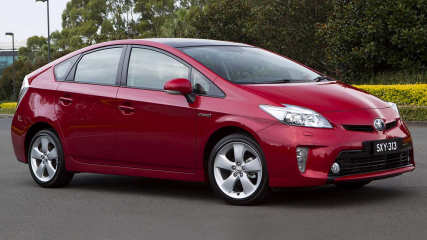Hybrid and electric cars are much easier on brakes
By Stephen Corby · 31 Oct 2023
There is a surprising benefit to driving a hybrid or electric car. It's got nothing to do with fuel economy or the range between charges.Instead, it's a massive saving on the cost of brakes. Yes, you probably knew that EVs save you money in the long run by being cheaper to fuel and service, but one very specific, and little discussed, area of saving is brakes.Because hybrids and battery cars are continually harvesting the energy normally lost as heat when slowing, there is much less stress on the brakes. That means much lighter wear on the brake pads and longer distances between skimming or replacing the rotors.Under deceleration, the car's electric motor enables "regenerative braking" for a vehicle, spinning to generate electric power which is fed to the battery pack.So, how does this technology work? Do hybrid brakes last longer? Is it the same for an electric car? If you’ve got questions, we’ve got answers. Read on to learn more about how ‘regen’ braking works.In a conventional car (one powered by an internal-combustion engine) the braking system uses friction to slow the car. As you press the brake pedal the brake pads clamp down on the rotors (or the brake drum if you’ve got an older or cheaper car) and slow the wheels down, just like they do on a bicycle.However, the story is very different on a car with an electric motor, either a full battery electric vehicle (BEV) or a hybrid model (HEV), as it can use the electric motor to slow the car.In basic terms, regenerative braking uses the resistance from the electric motor whenever you lift off the accelerator pedal to capture kinetic energy and slow the car down.What this feels like, in practice, is that the car is stopping without you even touching the brakes, or, to put it another way, like a far more extreme version of engine braking (drivers of manual cars will know this feeling).Obviously all BEVs and HEVs still have conventional brake rotors, pads and calipers, but because the electric motor is doing the majority of the work slowing the car, there is actually very little use made of the braking hardware.When a conventional car slows down the brakes convert the energy created in the friction process into heat, which is ultimately wasted energy. That’s not the case for electrified cars, with either an electric or hybrid brake system able to make use of that energy.Instead of generating heat, the regen braking produces kinetic energy and directs it to the battery pack, so not only are you slowing the vehicle down you’re also charging the battery. In a BEV that energy is all directed to the battery, while in a hybrid it can be used in a variety of ways, including powering the auxiliary systems like the air conditioning, or it can go directly to the battery for storage.Yes, because you’re not using the conventional mechanical braking hardware - the pads and rotors - nearly as much and instead relying on the electric motors to slow you down, so the brakes do wear a lot slower.However, it’s not as simple as asking ‘how long do brake pads last on a hybrid?’ or ‘how often do I need to change the brake pads on my EV?’ because every car is different.Both BEVs and HEVs can offer different levels of regen braking, allowing you to alter just how quickly the car slows when you lift off the accelerator.Often this is found in the multimedia system menu, but some modern electric cars, such as the Hyundai Ioniq 5 and Kia EV6, have paddles on the steering wheel that allow you to adjust levels quickly on the move.Why is this useful? Well, if you’re on a freeway or motorway you don’t want to slow suddenly whenever you lift off the accelerator, so you can set the regen to its lowest setting and coast like an internal-combustion vehicle.Then, when you find yourself in a stop-start environment, such as a suburban road or traffic jam, you can dial up the regen and harvest more energy for the batteries.Taxi drivers are reporting huge improvements in brake wear as they use 'regen' instead of the brake pedal to slow in stop-start traffic. One Camry hybrid driver says he did 400,000km on a single set of front brake pads, and Prius cabbies regularly record 200,000km-plus.It takes a while to adjust to regen driving, where you lift off the accelerator early before applying the conventional brakes for the last part of a big stop, but the benefits are obvious.
.jpg)


.jpg)

.jpg)



.jpg)
